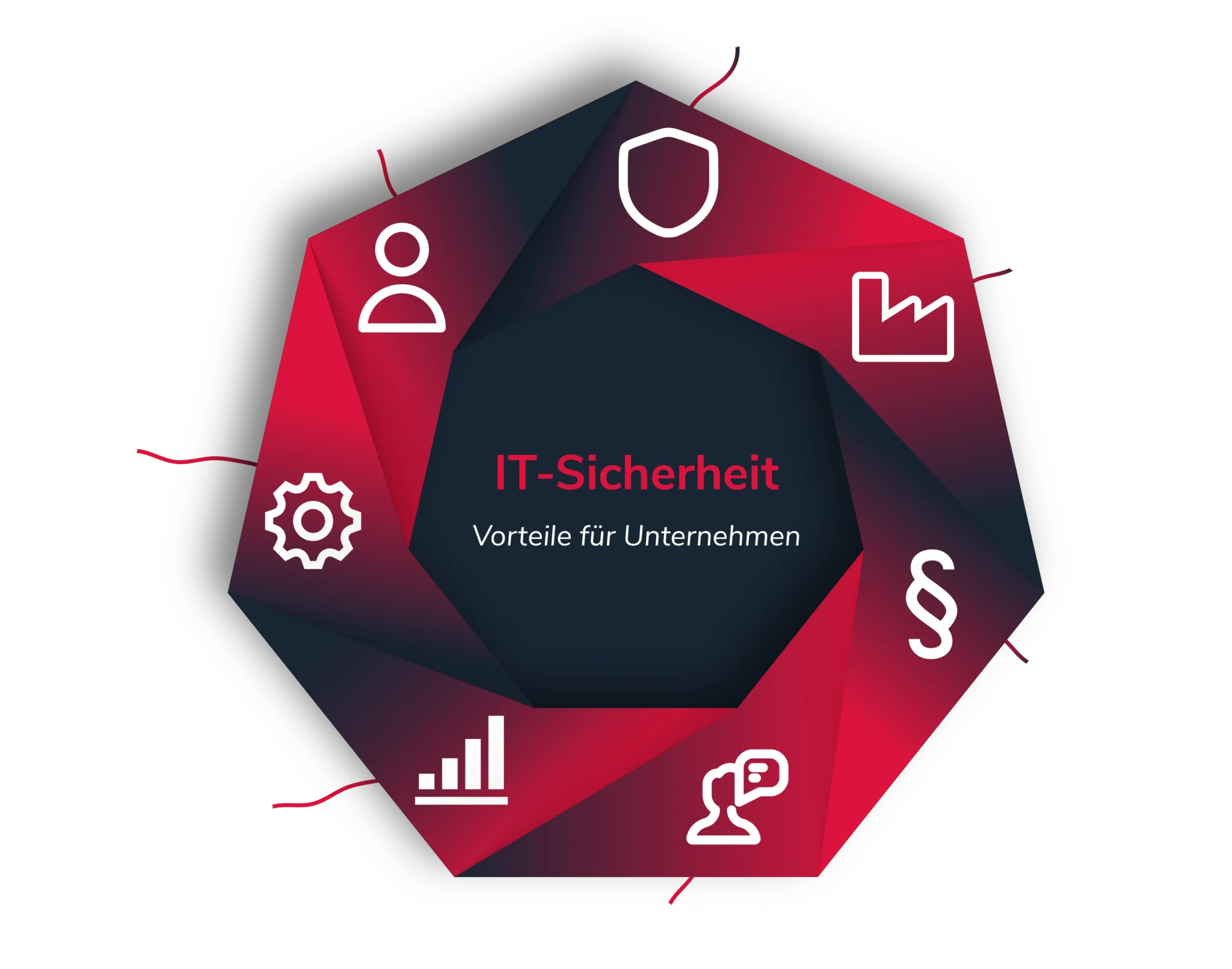Continuous Production Processes
IT security ensures that your production runs without interruptions. By protecting against cyber threats, you minimize the risk of downtime and guarantee continuous production processes.
Cybersecurity
PROTECT YOUR BUSINESS FROM CYBERTHREATS
Cybersecurity is the indispensable shield for your business. Without adequate security measures, data, productivity, and reputation are at risk. Invest in security to ensure long-term success – without halting business production.

Secure Business
Your Advantages Through IT Security
IT security is crucial for the success of your business.
Data Protection & Customer Trust
Our IT security measures not only secure your internal processes but also protect sensitive customer data. A high standard of data protection strengthens your customers’ trust and creates a solid foundation for successful business relationships.
Economic Protection from Cyber Attacks
Businesses are increasingly targeted by cyber attacks. Our IT security solutions offer comprehensive protection against malware, ransomware, and other threats. This minimizes economic damage and protects your company from financial losses.
Legal Compliance & Reputation
Compliance with legal regulations in IT security is crucial. Our solutions help you meet legal requirements, which not only avoids fines but also strengthens your company’s reputation. A secure reputation is a valuable asset in the business world.

CONSULTATION
Get advice now and secure your business.
As an award-winning Fortinet partner, we protect businesses against cyber attacks.
Cybersecurity Services
Our Cybersecurity Services
Antivirus, Antispam, Firewall, Monitoring, and Data Backup – All from One Source
Firewall = Security
Firewall
The firewall acts as a digital barrier, protecting your company's network from unwanted intruders. By controlling data traffic, it allows only authorized access.
Antivirus protection ensures that harmful software like viruses and malware is prevented from infiltrating your IT system. The firewall detects and blocks potentially dangerous content before it can cause harm.
A firewall safeguards sensitive company data from unauthorized access. It acts as a digital wall, preventing confidential information from falling into the wrong hands, thereby securing the integrity of your data.
The firewall serves as an early warning system, detecting suspicious activities to alert us in time about potential threats. This allows us to take proactive measures to minimize potential risks and ensure the security of our business.
The Benefits of a Firewall for Businesses
The Company is Protected
As a security barrier, the firewall secures your company’s network against unauthorized access and potential cyber attacks. By repelling unwanted intruders, it ensures the safety of your sensitive data.
Viruses Stand No Chance
The firewall acts as a reliable defense against harmful viruses and malware. It proactively blocks these threats, creating a secure IT environment and protecting the system from potentially harmful content.
Data is Secure
The firewall maintains the confidentiality of your company data by preventing unauthorized access. This protective measure ensures the integrity of your information and ensures that sensitive data is accessible only to authorized individuals.
Attacks are Detected
As an effective early warning system, the firewall proactively informs about potential threats. With these timely alerts, we can quickly and specifically implement countermeasures to ensure the security of your business.
Secure Network = Secure Data Transmission
Network Security
Effective protection against unauthorized access is crucial to ensure the integrity and security of your business. Unauthorized access can lead to data loss, industrial espionage, and reputational damage. Network security provides an extremely robust barrier to ensure that only authorized individuals have access to your business-critical network.
Ensuring the confidentiality of your company's data is of utmost importance to maintain the trust of your customers and partners. By implementing network security solutions, it is ensured that sensitive information is protected from unauthorized access. This helps to minimize financial losses, legal consequences, and reputation risks that can be caused by data breaches.
Secured Network
Secured Network
Ensuring Continuous Operation A securely configured network minimizes the risk of downtime and data loss, thus enabling smooth business operations. Preventing attacks and unauthorized access ensures that business-critical resources are continuously available.
Effective Protection Against Financial Losses
A secured network creates a safe IT environment by serving as an effective barrier against harmful viruses and malware. By proactively blocking these threats, it preserves the system from potentially harmful content, thereby contributing to reliable protection against financial losses.
Strengthening Customer Trust
A secured network clearly signals to customers that their data is protected. This strengthens the trust and credibility of your business, which in turn contributes to a loyal customer base and a positive reputation.
Compliance with Legal Requirements
Network security is often a fundamental requirement to meet legal standards and regulations. A well-protected network helps to comply with data protection laws and prevent legal challenges, which is crucial for the long-term existence of your business.
Secure PCs = Work Without Interruption
Client Security
Implementation and regular updating of antivirus software to protect endpoints from harmful software such as viruses, Trojans, and spyware.
Training employees to recognize phishing attacks and implementing mechanisms to prevent phishing attempts.
Developing and enforcing security policies for endpoints, including password policies, device access restrictions, and regular security updates.
Implementing encryption technologies and secure communication protocols to ensure the integrity and confidentiality of data transmitted between client devices and networks.
Client Security: The Benefits of Secure Endpoints
Malware Protection
Effective security measures effectively protect endpoints from malware infections. This minimizes the risk of data corruption, system failures, and financial losses that can be caused by malicious software.
Phishing Protection
Specialized mechanisms for detecting and blocking phishing attacks provide effective protection. Employees are protected from fraudulent emails and websites aimed at stealing confidential information. Efficient phishing protection helps to prevent data breaches.
Endpoint Security
Comprehensive security measures protect endpoints such as PCs, laptops, and mobile devices from various threats, including ransomware, spyware, and other attacks. This not only ensures the integrity of the endpoints but also protects the privacy of users.
Secure Network Communication
The implementation of security measures enables encrypted and secure network communication. This protects against eavesdropping and man-in-the-middle attacks, thereby ensuring the confidentiality of transmitted data. Secure network communication is crucial for data protection and the integrity of business information.
Secure Servers = Secure Data
Server Security
Implementation of strict access controls and authentication methods at the server level to ensure that only authorized users can access critical systems. This includes strong password policies, multi-factor authentication, and regular reviews of access rights.
Regular updating of server operating systems, applications, and software to close known security vulnerabilities. Efficient patch management reduces the risk of exploits and unauthorized access due to outdated software.
Configuration and monitoring of firewalls to control network traffic and block unauthorized access. This includes setting specific rules and filters to ensure that only legitimate traffic reaches the servers.
Implementation of systems for intrusion detection and prevention (IDPS). These systems monitor server traffic in real-time to identify suspicious activities and respond automatically if necessary.
The Benefits of Secure Servers
Operational Continuity and Reliability
Implementing server security measures improves the stability and reliability of the server infrastructure. This minimizes downtime and ensures continuous availability of business-critical applications, reducing financial losses due to interruptions.
Data Protection and Compliance
Server security ensures the protection of sensitive company data from unauthorized access, manipulation, or theft. This ensures compliance with legal regulations and industry standards, prevents legal consequences, and preserves the confidentiality of the data.
Protection Against Cyber Attacks and Data Theft
Robust server security protects against various attack vectors, including malware, denial-of-service (DoS) attacks, and data manipulation. This minimizes the risk of data theft and financial damages due to cyber attacks.
Trustworthiness and Customer Loyalty
Securing servers strengthens the trust of customers and business partners. A company that effectively protects its servers demonstrates responsibility for data privacy and security. This promotes customer loyalty and strengthens the company’s reputation.
Measures = Analysis | Consultation
Security Measures
Security Audits
Reviews to assess the effectiveness of security measures. The goal is to identify vulnerabilities and improve security policies.
Data Encryption
Protecting data by converting it into encoded text. This prevents unauthorized access and protects against data loss due to theft or hacking.
Compliance Management
Ensuring that a company meets legal requirements and internal security standards to avoid legal consequences.
Professional Penetration Testing
Targeted simulation of cyber attacks to identify security gaps. The goal is to improve the resilience of the system.
Vulnerability Analysis
Identification and assessment of security vulnerabilities in IT systems to take appropriate corrective measures.
Cloud Security & Data Protection
Security measures for protecting data and applications stored or processed in cloud services.
Mobile Device Management
Management and security of mobile devices (e.g., smartphones, tablets) within the corporate network to ensure data privacy and security.
Network Monitoring and Security
Continuous monitoring of networks to detect anomalies early, fend off threats, and ensure network security.
Antivirus = Protection
Antivirus Protection
Implementation of Antivirus Software
Introduction and use of specialized software designed to detect, block, and remove malicious software (viruses, malware) to protect computer systems from infections.
Real-Time Monitoring for Malware
Continuous, immediate checking of data and activities in real-time to promptly identify potential threats such as malware (malicious software) and take appropriate security measures.
Analyses = Report
IT Analysis
Review of IT Security
An external evaluation of the IT security measures by professionals not directly employed by the company. The goal is to obtain objective assessments and recommendations for improving the security infrastructure.
Analysis of Security Situations and Incidents
Investigation of existing security conditions and past security incidents. This involves evaluating events to identify patterns, pinpoint vulnerabilities, and develop preventive measures.
Contact Form
Contact us conveniently through the contact form and we will get in touch with you promptly.

